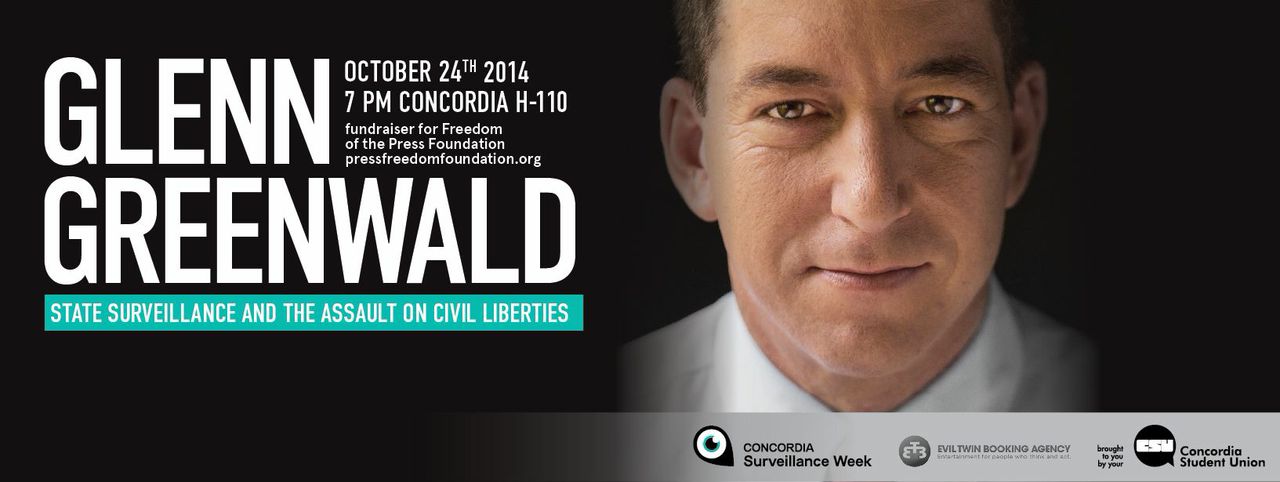Man behind Snowden’s leak to reveal extent of the modern surveillance state
On Friday, Oct. 24, Glenn Greenwald is coming to Concordia. For the uninitiated—or those living under a rock for the last year and a bit—Greenwald is one of the two journalists who brought the Edward Snowden leaks to the world and proved that America’s NSA was engaged in a massive, worldwide data-dragnet, scooping up every bit of information they could eavesdrop, buy, coerce, wiretap, or hack their way into.
Though there were a handful of leaks and even some class action lawsuits against the NSA’s operations before Greenwald published a single document, the American political and judicial system was doing a pretty good job at denying and suppressing the scope of its espionage industry.
A perfect example of the pre-Snowden environment lies with Mark Klein. In 2006, Klein blew the whistle on AT&T and their secret backdoor into customers and many other’s data. In a secret room the NSA had installed splitters to the backbone of the internet and was vacuuming up troves of data. The unclassified documents he supplied to a class action lawsuit against AT&T were undeniable proof of a wiretap unprecedented in scope, yet the U.S. Supreme Court, in 2012, upheld the immunity granted to the corporation by an appeals court, refusing to even hear the case.
The world had not yet tuned into the abuses by national security apparatus, and government officials were still considered honest and reliable sources. Some argued that Greenwald revealed very little that was not already known, at least in the early days of the leaks, but the true power of his revelations were in the government documents he could hold out as proof of the government’s perfidy.
The story of how Greenwald actually came into possession of NSA’s secrets unfolded like a spy novel full of clandestine meetings and intrigue.
Snowden flew to Hong Kong in late May and met with Greenwald and Laura Poitras in secret on June 1, 2013. Poitras was actually the first journalist to receive any documents from Snowden and was crucial to bringing Greenwald on board, as he had failed to take previous attempts at communication by Snowden seriously. Greenwald hadn’t taken the time to learn and install encrypted communication software that was a precondition for Snowden to talk about anything substantial, but Poitras did and she arranged the initial rendezvous.
The meeting itself took place in a high-end hotel in downtown Hong Kong where the trepidatious team of two — three if you include the producer that The Guardian foisted onto Greenwald and Poitras as a condition for their support though he was mostly kept in the dark — met with Snowden for the first time. They were shocked to meet, not the old and disenchanted bureaucrat of their imagination, but a 29-year-old man with access to America’s most secretive organization.
Four days later, after a battle with their publisher against the traditional restraint in reporting national security leaks, Greenwald published the first of his pieces on the surreptitious activities of the unrelenting agency known as the NSA.
Since that first article, Greenwald has started his own publication called The Intercept (www.theintercept.org). The project is funded by Pierre Omidyar, co-founder and chairman of eBay, and its founding editors are Poitras, Jeremy Scahill, and Greenwald.
Greenwald’s book, No Place To Hide, chronicles the complete odyssey of Greenwald obtaining, discovering the true depths of the documents, and fighting to publish his articles at a practically unprecedented speed. Not to mention the retribution by the government, who, according to his book, broke into his Rio de Janeiro home to steal laptops they believed to hold the leaked documents.
In all, Greenwald’s visit to Concordia should be, at very least, interesting if not altogether edifying.
Hosted by the Concordia Student Union, Greenwald’s speech, entitled “State Surveillance and the Assault on Civil Liberties,” will take place Oct. 24 at 7 p.m. in the H-110 auditorium. Tickets are $5 to $10 and can be purchased at the CSU offices. For more information, visit the CSU’s Facebook page.




